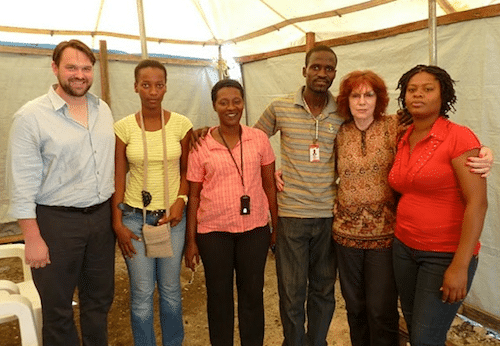GATHER Alumni Focus on Women’s Issues

On Thursday, September 5th, the Goldin Institute hosted its first ever women’s-focused joint discussion with GATHER’s global alumni as well as Chicago Peace Fellows. A lively and informative conversation unfolded over 90 minutes with GATHER alumnus Michelle Kuiper, Yale University researcher and field consultant Jillian Foster, as well as St. Louis, Missouri-based Pamela Merritt of Repro-Action.
At the outset, Pamela and Jillian gave full background descriptions of their respective journeys working in the fields of reproductive justice, and the impact of conflict on women’s general health and well-being. Earlier in her life, Pamela dealt with endometriosis and fibroids, and she spoke movingly about her challenges seeking consistent medical treatment, spurring her to advocate on behalf of poor, Black American women after a stint at Planned Parenthood USA.
[quote]She noted that while access to safe reproductive health and maternal care is a global crisis, the United States, surprisingly, has the worst outcomes for women in regards to infant mortality and maternal health in the so-called “developed world.”[/quote]
Jillian, a host on the “Radicals & Revolutionaries” podcast, works at the intersection of gender, violence, and health, focusing especially on the African continent, and recently returned from a spring of field research and consultation in Kenya, the Democratic Republic of Congo, Somalia and Ethiopia. When she learned the Goldin Institute works with GATHER alumni in Kenya, Somalia and Ethiopia, Jillian spoke of her recent findings and experiences in those nations. In Somalia in particular, she noted that constant armed conflict among multiple warring groups has drastically impacted the physical lives of women and girls, but also diminished the services available to them. She recommended that community “gate-keepers,” especially those in the faith-based spaces, were as-yet untapped leaders in gender protection. Regarding Kenya, Jillian felt that much of the sexual and gender-based violence against women and girls was a result of tumultuous elections, and that many female survivors have been silenced.
Kentucky-based GATHER alumnus Michelle Kuiper followed the two guest speakers by talking about her work supporting survivors of rape and sexual assault. For the past several years, Michelle has worked in her state and across the United States to mandate greater processing of rape testing kits as well as holistic, sustained support of women and girls dealing with the aftermath of violence.
[quote]Michelle pointed out that someone is a target of sexual violence every 92 seconds and one out of every three women globally will be a survivor of some form of sexual violence in her lifetime. [/quote]
Cameroon-based GATHER alumnus Alexander Gwanvalla shared with the speakers and attendees on the call that the issue of women’s health was particularly relevant to him as he lost his grandmother to excessive bleeding from menstruation. He asked the three women speakers, “In my community, we have medical crises, poor health systems and corruption. We also have various cultures within Cameroon with everyone valuing their own culture. Women's health care is very bad, often based around cultural herbalists that prevent medical treatment. What can I do to help my society in situations like this?”
In response, Pamela recognized how complex women’s reproductive health can be because of cultures and community belief systems.
“The first thing is to think about it in terms of public education which respects and honors those beliefs,” she said. “It is not about disproving but more about modern medicine supplementing [those systems]. It is hard to talk about it, but if we don’t, we have huge percentages of the population living in pain.”
From Somalia, Abdiweli Waberi weighed in by recounting that in 2017, when he spoke about gender-based violence in a public speech, it was shocking for a man to be discussing women’s issues. He noted that for every 10,000 mothers in his country, 1,000 die in childbirth.
[quote]“In Somalia, there is no domestic law that protects women from sexual violence, it isn’t seen as an issue that needs laws and punishments,” he explained. “Often, change is seen as ‘western,’ and rejected.”[/quote]
“You’re right,” Jillian responded. “It is extremely difficult for men to speak about women's issues. Talk about how men are not acting appropriately, and ask, ‘In our community, what does it mean to be a good man?’ When you’re doing this, speaking with religious and cultural leaders, weave into that [narrative] how violence against women is not a good thing and does not make a good man. Use the social structures to help change the behaviors.”
We invite you to learn more by viewing this recording of the conversation:
Ending Gender-Based Violence in Haiti

The Goldin Institute believes in the power of communities coming together to build their own solutions and determine their own futures. Key to our achieving our mission is ensuring that voices and perspectives that are often excluded from the discussion—often women—are heard and included.
From combatting gender-based violence in Haiti to improving microcredit in Bangladesh, women-led, community-based projects are integral to the Goldin Institute's work around the world.
Rape Accountability and Prevention
 The Haiti Rape Accountability and Prevention Project (RAPP) is designed to respond to the epidemic of rapes against poor women and girls in Haiti in the wake of the Jan. 12, 2010 earthquake. The program includes four closely integrated components: legal advocacy, healthcare, organizing, and public advocacy.
The Haiti Rape Accountability and Prevention Project (RAPP) is designed to respond to the epidemic of rapes against poor women and girls in Haiti in the wake of the Jan. 12, 2010 earthquake. The program includes four closely integrated components: legal advocacy, healthcare, organizing, and public advocacy.
RAPP provides individual victims of sexual assault the legal services they need to obtain justice and compensation, while working with allies in Haiti and abroad to transform the social context that underlies the vulnerability of all poor Haitian women to assault. The Project also aims to deter future rape by punishing the perpetrators and forcing a more effective response by law enforcement and the justice system.
Bangladesh: Restoring Recipient Voices to Improve Microcredit

The current debate about the efficacy of microfinance is marked by the absence of those who have most at stake in the controversy: loan recipients. The Goldin Institute is working to lift up these voices, most often marginalized women, and restore their perspectives, insights and aspirations to the discussion.
Based on our innovative Community Based Oral Testimony methodology, where villagers in Bangladesh interviewed their neighbors about their experiences as loan recipients, we have helped capture and document these voices and are hard at work to ensure that they are heard in Bangladesh and around the world.
This community driven research raises many questions about the claims of gender empowerment made by microcredit supporters. In the words of Kohinoor Begum, Community Researcher and loan recipient herself:
[quote]Generally, credit is given in the name of the woman. The credit agencies do not grant credit if there is not a woman residing in the household. This is why male members of our homes or husbands sometimes force us to take credit. But, if we take credit, we have to hand it over to our husband or father-in-law who uses it in any way he wishes." [/quote]
Kohinoor went on to testify to the hidden perils that women like herself have experienced due to the misuse and exploitative practices taken by the lending institutions and the men of the communities in the rural villages where we conducted our research:
[quote]But, the NGO employees come to recover the money from us (women) and we have to face many insults and indignities ... It is the men who spend the money. But, payment of installment is sought from the women. We talk of women before all and talk of empowerment, but women are used within the traps and labyrinths of micro-credit. Women are deprived of their rights. Since women have begun taking micro-credit, oppression on her has multiplied. The evil practice of dowry became manifold. Because of micro-credit, social solidarity in villages is at stake." [/quote]
- Kohinoor Begum, Community Researcher
New Findings in Gender Violence in Haiti
Today is the International Day for the Elimination of Violence against Women. The United Nations Development Program (UNDP) has released a new report with findings on how significant gender-based violence hinders development in Haiti. This piece summarizes some of the more significant discoveries made by the report.
Unfortunately, these findings are not entirely surprising and reinforce to us the importance of supporting women-led community based solutions to addressing violence. Our project work in Haiti allowed us to work with, and be inspired by, women who stood brave and used their own creativity to eradicate the violence they encountered in the aftermath of the 2010 Earthquake.
 Today is the perfect day to commemorate the work of our partners like Malya Villard-Appolon, who was instrumental in bringing her community together to combat sexual violence through her organization KOFAVIV. We salute the accomplishments made and the framework left in place to build on the good work done.
Today is the perfect day to commemorate the work of our partners like Malya Villard-Appolon, who was instrumental in bringing her community together to combat sexual violence through her organization KOFAVIV. We salute the accomplishments made and the framework left in place to build on the good work done.
Rape Accountability and Prevention in Haiti
Executive Summary of the Project
Since the Jan. 12, 2010 earthquake in Haiti, women and girls living in the internally displaced persons camps face alarming rates of rape and other forms of gender-based violence. In many camps, the rate of gender-based violence has exploded to three times pre-earthquake levels. In the year since the earthquake, our partners at KOFAVIV have documented 640 cases of rape in 2010.
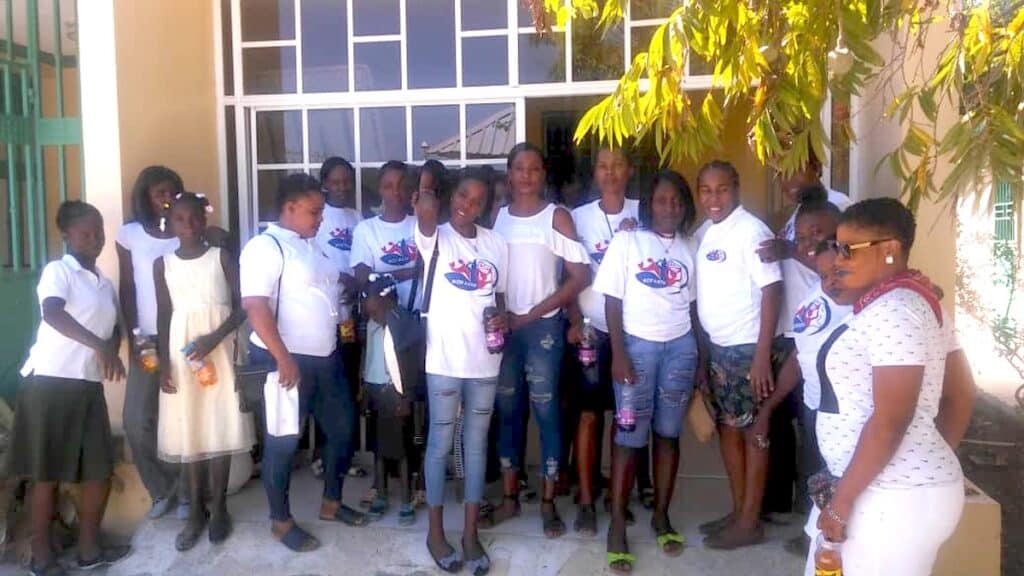
This pilot project is designed to provide security in the Place Petion community of Champ de Mars using women-led, community-based security teams to patrol the camp, discourage and disrupt incidents of gender-based violence and provide necessary escort services to vulnerable residents.
The Goldin Institute has partnered with KOFAVIV, FAVILEK, the Bureau des Avocats Internationaux (BAI), the Institute for Justice and Democracy in Haiti (IJDH) and its network of partners throughout Haiti to build and support a women-led, community-based pilot security platform in one representative displacement camp. This project builds on the strategy developed and implemented by KOFAVIV and FAVILEK, the GI's experience in creating grassroots partnerships for social change and the BAI / IJDH's capacity for legal advocacy in Haiti.
As part of the Rape Accountability and Prevention Project in Haiti, this security platform aims to prevent gender-based violence through the leadership and strategies of women's networks while the work of prosecution is ongoing. This pilot project is designed to serve as a model for community engagement and the provision of security that can be adopted by NGOs and the Government of Haiti.
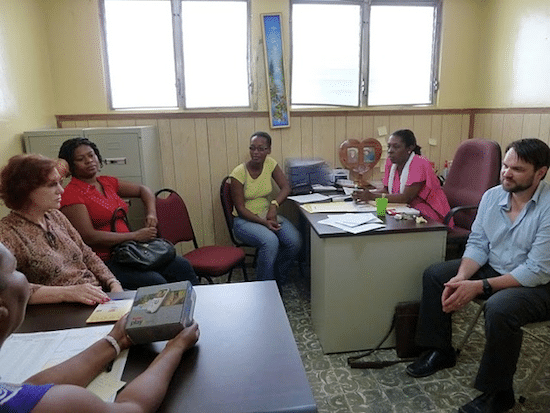
Project Rationale
The problem of GBV in post-earthquake Haiti must be understood within the broader context of the humanitarian response. There is a demonstrated lack of governmental response to sexual violence occurring in the camps. This failure to act appears to have two prongs—the Haitian Government lacks both the political will and the capacity to respond. Furthermore, despite billions of dollars being pledged by the international community for recovery, aid efforts have struggled to meet the basic needs of people living in IDP camps. Having no other options, Haitian grassroots women's groups have resorted to taking charge of their own security. Haitian women are both disproportionately impacted by the crisis and key to their country's recovery.
The reality is that grassroots women's groups have been mostly shut out from the process of crafting a response to the real threat of rapes in the camps. Meanwhile, they have mobilized their own solutions, distributing whistles to women living in camps and organizing groups of women to accompany each other to vulnerable locations like latrines, where many attacks have previously taken place. Each of the women engaged in the project brings a deep commitment to the work, and their life stories are a testament to that dedication.
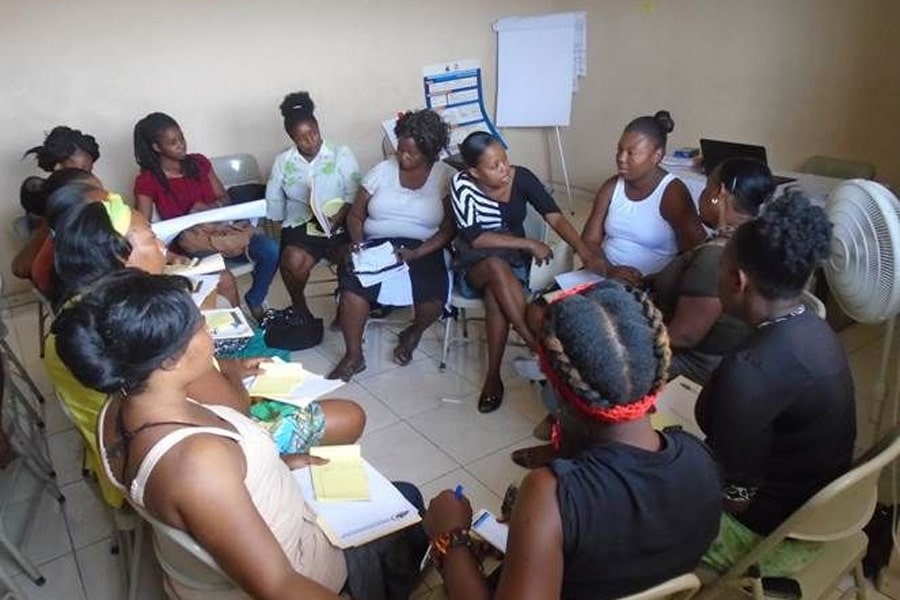
Brief History of the Project
The Haiti Rape Accountability and Prevention Project (RAPP) is designed to respond to the epidemic of rapes against poor women and girls in Haiti in the wake of the Jan. 12, 2010 earthquake. The program includes four closely integrated components: legal advocacy, healthcare, organizing, and public advocacy. RAPP provides individual victims of sexual assault the legal services they need to obtain justice and compensation, while working with allies in Haiti and abroad to transform the social context that underlies the vulnerability of all poor Haitian women to assault. The Project also aims to deter future rape by punishing the perpetrators and forcing a more effective response by law enforcement and the justice system. In February 2011, the Goldin Institute began its association with RAPP with the Camp Security and Sensitization Project.
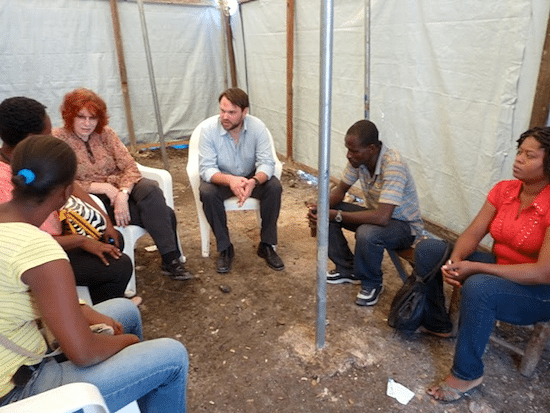
Shared Goals of the Project
This project seeks to substantially improve security and bring an end to gender-based violence in the camp where it is piloted in the Place Petion section of Champ de Mars. In addition to the immediate impact of improved security, we hope that it will provide some meaningful work for security providers and highlight the efficacy of partnering with community based groups, especially those led by women. We hope that this project will serve as a model for the Government of Haiti and relevant NGOs that will be able to scale up this important women-led, community-based initiative.
If successful, this project may also serve as a model for similar grassroots partnerships within the Goldin Institute's global network.
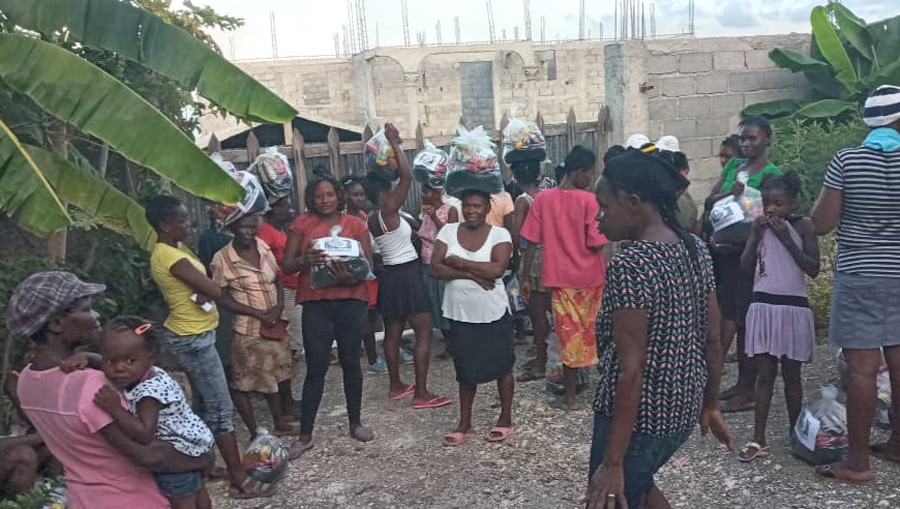
Project Outcomes
- Immediate and sustained reduction in gender-based violence in Champ de Mars.
- Improved sense of security for vulnerable people in Champ de Mars.
- Opportunity for women to design, lead and implement an innovative community based initiative.
- Increased cooperation between women's groups and the network of partners in Haiti.
- Augmented international profile for local partners through sharing the success of the project broadly.
- Opportunity to engage relevant parties in NGOs and the Government to educate them on the need and efficacy of working with grassroots groups, especially women's groups.
Community Based Oral Testimony
Community Based Oral Testimony
Rethinking Research from the Perspective of Community Experience
In debates on development, the voices of those it affects the most are often conspicuously absent. Our strategy for bringing their voices back in was simple: we decided to ask them. We adopted a strategy known as "oral testimony" which relies on extended semi-structured interviews to let participants tell their own stories in their own words, share their opinions and experiences and convey their own understandings of how development and poverty has transformed the history of their lives and villages.
 We wanted to take this approach a step further. Often oral testimony research is colored by power-dynamics between "researchers" and "subjects". Within these dynamics, answers to questions are often pre-determined by what each party expects to hear from the other. We decided to address this by inviting microcredit recipients in Arampur, a village in rural Northern Bangladesh, to interview each other about their own experiences with loans. We hoped that the content of these interviews would be shaped by mutual dialogue, rather than by top down agendas and expectations about what we, as researchers, wanted to hear.
We wanted to take this approach a step further. Often oral testimony research is colored by power-dynamics between "researchers" and "subjects". Within these dynamics, answers to questions are often pre-determined by what each party expects to hear from the other. We decided to address this by inviting microcredit recipients in Arampur, a village in rural Northern Bangladesh, to interview each other about their own experiences with loans. We hoped that the content of these interviews would be shaped by mutual dialogue, rather than by top down agendas and expectations about what we, as researchers, wanted to hear.
In order to do this, we trained a group of villagers in basic, qualitative research techniques and invited them to interview their peers and neighbors. The result was open-ended, conversation-style interviews, recorded using digital-audio recorders, in which the interviewees participated in directing the discussion by framing conversations through stories, life experiences and their own personal histories with microcredit lending organizations. Using this approach we heard what people had to say about microcredit on their own terms.
"There are many things hidden there that nobody knows, not everyone feels comfortable about saying everything any place. There are so many secrets to know, so many strange events that have happened, I never heard of anything like these stories before. There are so many kinds of people in this world! Even I myself have a long history which cannot be told in one sitting." - Kohinoor Begum, Community Researcher
What are the advantages of this approach?
- The community researchers themselves were all microcredit loan recipients. They were able to give us early insight into the landscape of credit and poverty within the village. They participated in shaping and revising our research goals to better answer our questions about microcredit, as well as transforming the strategies we employed to accomplish them.
- As community members, they understood the best ways to conduct the work within the cultural context of rural Bangladesh. They understood what the best times to approach people were, how to make each interview session as comfortable for respondents as possible, how to best navigate the complexities of rural Bangladeshi household and gender power dynamics, and how to ask probing questions without crossing sensitive lines.
- As community members, they understood the best ways to conduct the work within the cultural context of rural Bangladesh. They understood what the best times to approach people were, how to make each interview session as comfortable for respondents as possible, how to best navigate the complexities of rural Bangladeshi household and gender power dynamics, and how to ask probing questions without crossing sensitive lines.
- Respondents were more comfortable speaking with their neighbors than they would be with a researcher from outside. Respondents did not have to explain taken for granted points. They did not have to couch their language or speaking style to be understandable to an outsider. Further, the semi and unstructured interview strategy allowed the respondents to direct the conversation, steering discussions to what they wished to talk about.
- Community researchers were better situated to explain and help us interpret stories and experiences as they were shared. They did this by recording audio field notes after every interview and by sharing their stories in daily debriefing sessions.
- Community researchers were able to elicit different kinds of responses and stories than those we could have gathered on our own. The stories shared by respondents were of a remarkably different kind than those that could or would have been shared with outside researchers. As such, the interviews collected by our fieldworkers contain different kinds of insights, stories, and critiques that shed a new light on microcredit in rural Bangladesh.
- Community researchers knew their community and therefore knew what questions to ask. They knew their respondents and were able to ask about specific incidents from their lives and histories. They could seek targeted information about their families and livelihoods. They knew the intimate details of cultural, agricultural, and political processes in the village. They were able to ask questions that pertained directly to local practices and histories.
